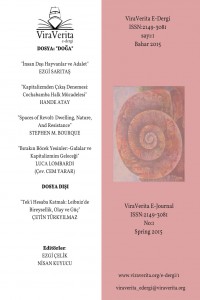Öz
Doğanın sonsuz bir girdi olarak doğal kaynaklara dönüştürüldüğü kapitalizm içerisinde, kapitalizme karşı mücadele ederken, çıkmazlara hapsolmamak için mücadelenin inşasında yol haritası çizmek gri teorinin yeşil yaşam ağacına dönüştürülmesinde öncelikle önem taşır. Bu düşünceyle bu çalışmada, ekolojik krize karşı emek ve doğa sömürüsü ekseninde yürütülen ekososyalist mücadele penceresinden 1990’lı yılların başında adı Su Savaşları ile anılan Bolivya Cochabamba halkının su mücadelesi incelenecektir. Bu amaçla öncelikle mücadelenin arka planında Bolivya’daki politik ve ekonomik duruma kısaca değinilecek ardından su ve enerji özelleştirmelerine karşı yükseltilen Cochabamba halk mücadelesinin özneleri ve tabandan kurduğu toplumsal erkleri ortaya koyulmaya çalışılacaktır. Daha sonra su hakkını BM gündemine taşıyarak uluslararası bir norm olarak dünyanın gündemine getiren mücadele izleğine, Doğa Ana Hakları ve İklim Değişikliği Konferansı çerçevesinde, ekolojik krize karşı iklim adaleti hareketi bağlamında bakılacaktır. Son olarak özelde Cochabamba halk mücadelesinin kapitalizmden çıkış denemesindeki iç bunalımlarına, genelde ise ekoloji mücadelesinin toplumsal muhalefet alanındaki yansımalarına, içeriden bir özeleştiriyle ekososyalizmin temel argümanları ışığında çözüm önerisi getirilmeye çalışılacaktır.
Anahtar Kelimeler
Ekososyalizm ekoloji hareketi demokrasi sınıf ve kimlik su hakkı.
Öz
In the struggle against the capitalism which converts nature into the natural resources and in the construction of the struggle, drawing a road map in order to get out of possible deadlocks is important before all to transform the grey theory into the green tree of life. With this in mind, in this study, the struggles of Bolivian Cochabamba people whose names are known for the Water Wars in the beginning of 1990s for water will be examined within the perspective of the eco-socialist struggle which was carried out against the exploitation of nature and labor. For this purpose, firstly, Bolivian political and economic situation on the background of these struggles will be mentioned, and, then, the actors and the forces that emerged from the bottom of the Cochabamban popular struggle against water and energy privatization process will be handled. Then, the path of the struggle in which the right to water has been brought to the agenda of the UN as an international norm will be traced within the context of The World People’s Conference on Climate Change and the Rights of Mother Earth and The Climate Justice movement for the ecological crisis. Lastly, within the light of the fundamental arguments of the eco-socialism, some (self-)critical remarks upon the internal crises of the popular Cochabamban movement in getting rid of the capitalism in particular, and upon the reflections of the ecological struggle in terms of social opposition in general will be brought.
Anahtar Kelimeler
Eco-socialism ecology movement democracy class and identity the right to water.
Ayrıntılar
| Diğer ID | JA35MJ62FT |
|---|---|
| Bölüm | Makaleler |
| Yazarlar | |
| Yayımlanma Tarihi | 13 Temmuz 2016 |
| Gönderilme Tarihi | 13 Temmuz 2016 |
| Yayımlandığı Sayı | Yıl 2015 Sayı: 1 |
ViraVerita E-Dergi, Creative Commons Atıf-GayriTicari 4.0 Uluslararası Lisansı (CC BY-NC) ile lisanslanmıştır.

